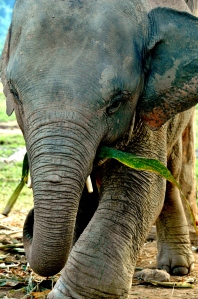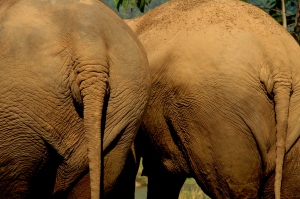I have been obsessed with visiting SE Asia for many, many years. I would see these beautiful, breathtaking photos full of spice and fabrics and jungles and elephants, and would imagine the people I could meet and the photos I could take when I finally got over that way.
Last year, my parents, husband, and I decided to meet in Thailand for three weeks. I had the tickets booked and travel guides ordered before we even got off the phone. It was pretty much all I could think about, all the time. I told anyone who would listen about the trip and the things I had been desperately waiting to do there, and riding an elephant was at the top of my ever-growing list.
Naturally, I started to research. If I was finally going to ride an elephant, I wanted to ride the finest elephant who lived in the finest jungle and who would give me the finest ride my tourist dollars could buy.
Unfortunately, instead of unearthing the best elephant riding experience in Thailand and reading stories about the life-changing experiences others before me had shared, I unearthed a whole dung-pile of elephant research which simultaneously broke my heart and blew my mind.
Here is what I learned.
1. Elephants have families, too
Elephants have families, both biological and tribal. They grieve when one of their family members pass away, and welcome their members back into their tribes with open trunks if they are reunited, even if over two decades have passed since separation.
Elephant families take care of their elders and adopt a community mentality when raising their young. Elephant babies are cared for by elephant nannies during the day, so that elephant mommies are able to rest up for long nights of nursing and playing. Blind elephants survive because their family members lead them to food (although sometimes, they miss out on the best offerings!), and elephants are the only animals who have proven that they are able to learn to problem solve in teams, just the way humans do.
See here, here, and here for more information.
2. Elephants are actually scared of mice
Or, rather, Elephants have extremely sensitive trunks and feet, which means that they don’t like small animals who can crawl over them, because it tickles. See here for a video of a baby elephant being tickled for the first time.
Unfortunately, elephants are extremely sensitive to noise, vibrations, bright lights, and music. Imagine what this means for elephants who are used for street begging, who are sold into the circus, or who are forced to walk up and down the tourist sites of Thailand whilst people pay to have their photos taken with them. They are permanently terrified, overwhelmed, and exhausted.
See here for a video of an elephant who was rescued from street begging.
3. Elephants hate being ridden
In order for an elephant to accept a rider or other parcel on their back, they have to undergo a vicious tradition known as Phajaan in Thailand. Phajaan means ‘crush’, and it succinctly describes what happens to an elephant’s spirit while it is ‘trained’ to provide entertainment for tourists. In short, a baby elephant is taken from its mother and family, trapped in a small cage, abused with bull hooks and sticks and nails, sleep deprived, sometimes blinded in one eye, and otherwise tortured until they become submissive. Only then will they be too broken to resist when rugs, chairs, fabrics, and humans are strapped to their backs whilst they are forced to smile pretty for the cameras.
If that isn’t bad enough, Elephant backs are surprisingly weak, are not designed to carry cargo, and simply cannot handle the wait of humans. Long-term riding can cause permanent spinal damage, broken skin, open sores, and painful blistering. This is significant considering elephant skin is over an inch thick. Those elephants you see draped in beautiful fabrics and strapped into carrying chairs are, without doubt, in permanent pain. They are broken, and in agony, and their lives are dictated around the whims of their captors and around how much money they can bring in each hour.
See here for more information.
4. We all have a role to play to keep these Gentle Giants free
There are lots of wonderful organizations out there who are advocating for elephant freedom and safety each day. I had the real honour of visiting one of them, the Elephant Nature Park in Chiang Mai, and will blog about that separately.
However, this is something that every single traveler has the power to do something about, simply by withholding their patronage of any organization which offers elephant rides, elephant circuses (or any animals in circuses, for that matter), elephant products, and any other form of elephant entertainment. Voting with your feet will, in this case, take the power away from those who are cruel to elephants for money. If you want to go one step further, do what I did and spend your money supporting organizations which protect and free elephants- therefore providing jobs and a boost to those involved in ethical tourism.
My bucket list still includes spending time with elephants, and getting amazing photos of these inspiring creatures. I’ve just changed my mind a little about how I’m going to do that. Here are a few snapshots I got, with no chains, bullhooks, or cattle prods in sight.



Nice piece, we love Elephants too. Like that you support the fact the shouldn’t be treated like they are in SE Asia… Its such a shame…
Thanks so much!! Please do share widely. I have another piece on elephants coming- about the sanctuary in Thailand.
I look forward to it
Great! I’m just getting starting blogging so really appreciate all the shares and feedback!
I’m volunteering as a vet at the Elephant Nature Park for a week in January!!!!!!!
Thank you Amanda, lots of interesting info on elephants. Never realised how much discomfort was experienced by the elephants when humans sat on their backs.